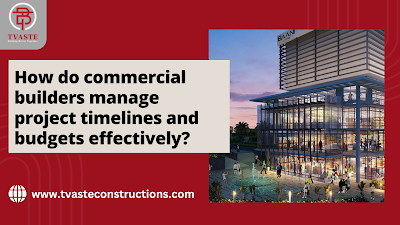How do commercial builders manage project timelines and budgets effectively?
Introduction:
Careful Planning:
Meticulous planning is essential for successful commercial construction projects. Builders outline project scopes, deliverables, and milestones in detail to create a clear roadmap from start to finish. By breaking down the project into manageable phases and tasks, builders can accurately estimate resource requirements and anticipate potential challenges, thus laying a solid foundation for adherence to timelines and budgets.
Harnessing Advanced Technologies:
Commercial builders leverage cutting-edge technologies to streamline project management processes. Building Information Modeling (BIM) software and project management platforms offer invaluable tools for enhancing communication, collaboration, and efficiency. Real-time data insights enable builders to track progress, identify bottlenecks, and make data-driven decisions, empowering them to stay ahead of schedule and within budget constraints.
Effective Resource Allocation:
Builders excel in resource allocation, assigning manpower, materials, and equipment strategically to maximize productivity and minimize waste. By careful resource planning and optimization, builders ensure that resources are allocated judiciously across different project phases, preventing overruns and delays. Builders strike a balance between resource availability and project requirements to uphold project timelines while optimizing costs.
Proactive Risk Management:
Effective project management in commercial construction involves anticipating and mitigating risks. Builders conduct comprehensive risk assessments, identifying potential threats to project timelines and budgets, ranging from inclement weather to supply chain disruptions. By implementing proactive risk mitigation strategies and contingency plans, builders safeguard against unforeseen challenges, ensuring that projects stay on track and within budgetary limits.
Streamlined Communication and Collaboration:
Seamless communication and collaboration are vital for synchronizing efforts across diverse project stakeholders, including architects, engineers, subcontractors, and clients. Commercial builders foster a culture of open communication and collaboration, leveraging regular meetings, progress reports, and digital communication channels to keep all parties informed and aligned. By fostering transparency and accountability, builders cultivate a collaborative environment conducive to meeting project objectives efficiently.
Continuous Monitoring and Adaptation:
Commercial builders prioritize continuous monitoring and adaptation to evolving project dynamics. Builders employ robust monitoring mechanisms to track progress against milestones, identify deviations from the plan, and implement timely adjustments as needed. By staying agile and responsive to changing circumstances, builders navigate potential roadblocks swiftly, safeguarding project timelines and budgets.
Embracing Sustainable Practices:
Modern commercial builders prioritize sustainable construction practices, which involve using sustainable materials, energy-efficient technologies, and environmentally conscious construction methods. Embracing sustainable practices not only reduces carbon footprint but also enhances project efficiency and cost-effectiveness. Sustainable practices contribute to long-term savings, aligning with both economic and environmental objectives.
Client-Centric Approach:
Commercial builders prioritize client satisfaction by adopting a client-centric approach that focuses on understanding and exceeding client expectations. Builders engage clients proactively throughout the project lifecycle, soliciting feedback, addressing concerns, and adapting to evolving requirements. By fostering strong client relationships built on trust and transparency, builders cultivate repeat business and referrals while delivering projects on time and within budget.
Continuous Learning and Improvement:
Builders embrace a culture of continuous learning to stay ahead in the ever-evolving landscape of commercial construction. Builders invest in professional development and stay abreast of industry trends, best practices, and emerging technologies. By fostering a culture of innovation and improvement, builders enhance their expertise and deliver better projects.
Conclusion:
Commercial builder's construction necessitates a multifaceted approach to master project timelines and budgets, which involves meticulous planning, technological innovation, effective resource management, proactive risk mitigation, streamlined communication, sustainability, client-centricity, continuous improvement, and adaptation. By integrating these strategies and principles into their project management practices, commercial builders uphold the highest standards of excellence, delivering successful outcomes that stand the test of time.




Comments
Post a Comment